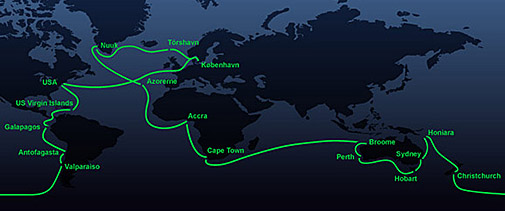The Galathea 3 expedition

The Department was involved in the following research projects:
• A global perspective on dissolved organic matter and the smallest organisms in the world (Full expedition term)
• Genetic identification and classification of unicellular parasites of marine zooplankton (Nuuk > Acores > Accra. 11/9-3/10)
• The importance of climate and degree of isolation on biological relationships and biodiversity in lakes - from the Arctic to the tropic, from continents to islands and from the past to the present (Nuuk > Acores. 11/9-18/9 - Perth > Hobart. 23/11-7/12 - St. Thomas > St. Croix > St. Thomas. 17/3-28/3)
• Phylogeny and taxonomy of tropical, free-living dinoflagellates - species diversity studies in a modern context (Cape Town > Australia. 18/10-approx. 20/11)
• Plankton dynamic in the Andaman Sea - new ways in the tropical plelagic food web (Cape Town > Australia (18/10-approx. 20/11)
• Comparative studies of the physiology and cardiovascular anatomy of white- and red-blooded Antarctic fish (Christchurch > Valparaiso. 11/1-8/2)
• Geomicrobiology of oceanic oxygen deficiency zones, GOODZ (Valparaiso > Antofagasta > Galapagos. 11/2-4/3)
• Studies of the protist diversity in oxygen-deficient marine sediments from different climatic zones by clone libraries, temperature gradient gel electrophoreses (TGGE), dilution cultures and single-cell-sequencing (Valparaiso > Antofagasta > Galapagos. 11/2-4/3)
• Comparative studies of plant populations and communities in the Galápagos Islands and Isla de la Plata (Antofagasta > Galapagos. 15/2-4/3)
• Tropical sea grasses (St. Thomas > St. Croix > St. Thomas. 17/3-28/3)
Read more about the research projects at the official Galathea 3 website.
